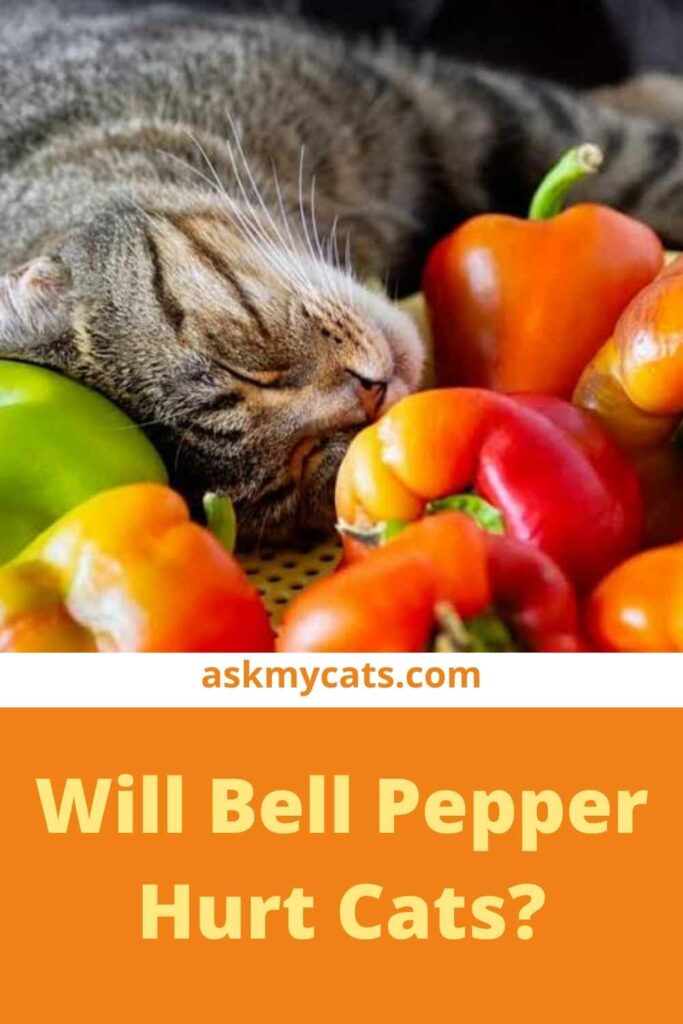Bell Peppers are safe for cats to consume. Peppers are neither poisonous nor dangerous to cats in any way if given in small amounts.
So, if your cat has nibbled on any pepper, it’s nothing to worry about. It should come as no surprise, though, that cats should not eat pepper much.
Cats have delicate stomachs and a wide range of nutritional needs. They aren’t going to gain anything by eating peppers. If they like pepper, then give them a small amount as a special treat on rare occasions.
If they consume any more, you risk having a pepper-craving four-legged monster with an upset stomach.
If you want to learn more about cats and their love for peppers, keep reading!


Give Your Cat the Perfect Day
Get the Free Ebook!
Can Cats Have Raw Bell Peppers?
Yes, cats can consume raw bell peppers. The American Society for the Prevention of Cruelty to Animals (ASPCA) has given bell peppers the green light for cats. However, this isn’t to say they’re safe for cats, it merely means they’re neither toxic nor harmful.
With this in mind, there’s no need to hide your peppers or hurry your cat to the doctor if he or she eats any. However, feeding peppers to your cat is still not a good idea.
The reason for this is because peppers lack the nutrients that cats require in their diet. Cat meals are carefully made to offer all of the nutritional content they require, so you should always serve them a well-balanced diet of foods that are age-appropriate.
Can Cats Eat Banana Peppers?
No, cats should not eat banana peppers. The consumption of banana pepper by cats can be quite harmful.
Glycoalkanoid Solamine is a chemical found in peppers that may be toxic to cats. Keep a watch on your cat over the following 24 hours or so if you’re confident it only got a small nibble.
If your cat ate them and it was detrimental to them, you might notice vomiting, drooling, lethargy, diarrhea, and other symptoms. Try to keep your cat away from them as there is no nutritional advantage to a cat eating them.
Will Bell Pepper Hurt Cats?

Although bell pepper plants do not have a high toxicity level, they are difficult to digest. As a result, you should not allow your cat to eat these plants.
Furthermore, bell pepper plants are bitter, and your cat is unlikely to enjoy them. Therefore, while eating bell pepper isn’t always hazardous to your cat, she should avoid it.
However, when mixing human foods with your cat, such as bell peppers, keep an eye out for allergies or intolerance the first time.
Food allergies in cats manifest themselves in the following ways:
- Flatulence
- Vomiting
- Diarrhea
- Itchy or inflamed skin
- Excessive itching and hair loss
- Gurgling noises in tummies.
If you see any of these indications in the hours, days, or weeks after your cat eats a bell pepper, visit a veterinarian.
Are Red Peppers Toxic To Cats?
Red bell peppers are preferred by cats over their yellow counterparts. This is due to the fact that the former is far more delicious and sweet than the latter. It’s no surprise that the red variety is the most popular and preferred of the three.
Red bell peppers also have higher vitamin C and beta-carotene than green bell peppers. Thus, red bell pepper is not toxic to your cat.
Don’t be afraid to give your cat a small slice of red bell pepper. Just don’t give it too much to eat.
Can Cats Eat Bell Pepper Seeds And Leaves?
Bell pepper plants’ seeds and leaves are not toxic to cats.
Don’t panic if you have any growing in your garden or greenhouse. Nevertheless, it’s still a good idea to keep them safe from cats.
There’s always the possibility that a cat will take an interest in a plant and chew it. They may also do a lot of harm in a short amount of time.
A cat will also vomit if they consume too much plant materials, even if it is not harmful in any manner. Therefore, keep your cat away from pepper seeds and leaves.
Can Cats Eat Red Pepper Flakes?

There’s no danger in giving your cat a red pepper flakes as long as your cat doesn’t display any negative effects.
However, keep really spicy foods out of the cat’s reach, and make sure the peppery treats are only offered on rare occasions.
You should not allow your cats to eat spicy foods since it may irritate their tummies and make them sick. Capsaicin, the flavoring in many spicy foods, can cause your poor cat a lot of gastrointestinal problems, including vomiting. Your cat’s eyes may get watery, and she may have a runny nose as a result.
Many human meals, like jalapenos, chili peppers and red pepper flakes, contain capsaicin. Small quantities can be found in spices like oregano, cinnamon, and cilantro that you might not anticipate.
Therefore, keep an eye on the amount of red pepper flakes your cat consumes. Eating it in huge amount may be detrimental to your feline friend’s health. Take her to a veterinarian if you notice any adverse effects.
Is It Safe For Cats To Eat Jalapenos?
Jalapenos have a strong odor, are chewy, and are the perfect size for a cat’s mouth. Because of the capsaicin, jalapenos are toxic to cats and should be avoided.
When compared to humans, cats have a lot of extra senses, but the taste isn’t one of them. They can detect spicy meals, but they’re bad for them, so keep it to a minimum.
Cats should not consume jalapeno peppers. Jalapeno peppers, like many other varieties of spicy peppers, contain a chemical called capsaicin, which causes their mouth to burn when they consume them. They could possibly be more sensitive to it than humans are.
Can Cats Eat Jalapeno Chips?
Cats should not consume hot jalapeno chips. Spicy food is not advised for your cat since it might be harmful.
Garlic powder, onion powder, capsaicin and pepper in jalapeno chips are the most common culprits. It’s a good idea to get your cat some better cat-friendly treats.
Can A Cat Die From Eating Jalapeno?

In a nutshell, jalapenos are bad for cats. While they aren’t poisonous to cats, the capsaicin in them can irritate a cat’s sensitive digestive system. Burns to the mouth, esophagus, and other areas of the digestive tract are possible side effects of capsaicin.
If your cat has eaten jalapenos, you may observe the following symptoms:
- Nausea
- Vomiting
- Diarrhea
- Burns on the paws and face
- Inflammation of the skin
- Breathing problems/wheezing
It’s time to call the doctor if you detect any of these signs in your cat. Make sure your vet knows how many jalapenos or how much pepper your cat has consumed. Also, tell them about the jalapeno your cat ate. This information will be beneficial to the veterinarian.
What Do I Do If My Cat Ingests Jalapeno?
The course of treatment will be determined by your cat’s symptoms. If she is vomiting or has diarrhea, the veterinarian has medicines that can help. If your cat’s stomach has been irritated by the jalapenos, the vet may prescribe medicine to help it settle down.
In addition, if your cat has been vomiting and diarrhea for a long time, the doctor may recommend IV fluids. These aid in the rehydration of your pet. Other symptoms, such as skin irritation, mouth burns, and more, will be treated by the veterinarian as they develop.
Frequently Asked Questions
Can Peppers Kill Cats?
There’s no danger in giving your cat a pepper preference if you don’t mind sharing your meals—as long as your cat doesn’t display any adverse effects. Even a little amount of chemicals can harm your cat’s red blood cells, resulting in anemia or death.
Can Cats Eat Seasoned Chicken?
Chicken that has been seasoned, especially with spices like garlic and onions, should not be served to your cat. Many herbs, spices, and oils that are good for people may irritate your cat’s stomach. Some are even poisonous to cats, such as garlic and onions.
Can Cats Eat Egg?
Cooked eggs are the only method to give your cat an egg. E. coli or salmonella, which can cause significant gastrointestinal issues in your cat, can be found in raw eggs. Raw eggs should not be given to cats who are even on a raw diet.
Final Words
Bell peppers are neither poisonous nor dangerous to cats, therefore they are one of the things you may feed them if you want to.
Only offer your cat a little amount of anything that isn’t specifically designed cat chow. Also, test a tiny quantity the first time and wait a few days to see if your cat have any food sensitivities.
Peppers are high in vitamins, but they won’t provide the same health advantages to your cat as they do to us. We’re not sure why certain cats are so fond of specific meals, but it’s a pleasure for them.
Feel free to drop your question regarding your feline friend in the comment section below.
